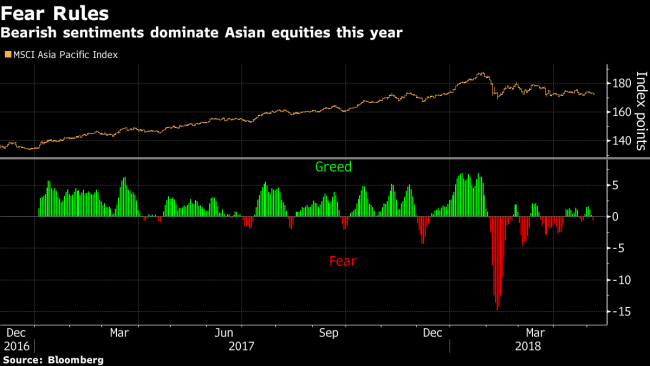(Bloomberg) -- It’s a losing streak investors haven’t seen since 2002.
The benchmark MSCI Asia Pacific Index fell for a tenth consecutive day Wednesday, extending its recent decline to about 5 percent and bringing the loss in value to almost $700 billion this year.
And there’s a slew of reasons: trade, the U.S. dollar, emerging-market turmoil and the bear market in Chinese stocks to name but a few.
“Asian stocks have been caught in the middle of increasing trade tensions as well as the rising dollar and emerging market contagion, and certainly China weakness is also adding fuel to the fire,” said Nader Naeimi, head of dynamic markets at AMP Capital Investors Ltd.
Most individual Asian stock markets fell Wednesday, led by declines in Japan and Hong Kong. The Topix index fell 0.6 percent while the Hang Seng Index slumped another 0.5 percent after entering bear market territory yesterday. Meanwhile, the Shanghai Composite Index neared a four-year low as policy makers’ attempts to lift sentiment fail to gain traction.
Here’s what strategists are saying about the current state of play in Asian stocks:
Emerging Market Spillover
“There’s more contagion coming from Turkey and Argentina events to the more externally susceptible economies like Indonesia and Philippines,” said Ken Peng, strategist at Citigroup Inc (NYSE:C). Both Southeast Asian nations have “double deficits, they have inflation that is relatively high and rising. And their reserves are falling.”
Trade
The “clear concern” in the short term is trade tensions, said Michael McCarthy, Sydney-based chief market strategist at CMC Markets. While signs of a de-escalation would be positive, that seems unlikely in the current environment, he added.
“The biggest risk is trade,” Citi’s Peng said, citing that “people are very afraid of” the additional $200 billion in tariffs. He noted that the midterm elections on Nov. 6 is key and trade tensions may dissipate after that.
Greenback
The slump in Asian stocks is mainly due to the continued strength of the U.S. dollar against emerging-market currencies, Paul Kim, chief investment officer at Eastspring Investments said. He expects an outflow from emerging markets with the Federal Reserve still on course to increase interest rates.
Still Bearish
“We maintain a bearish stance on Asia and EM equities and expect further downgrades to consensus earnings estimates in coming months,” said Jonathan Garner, managing director at Morgan Stanley (NYSE:MS), citing “a slowdown in China’s growth consequent upon credit tightening” and weaker demand in autos and technology hardware.
Premature
“Asia is certainly cheaper and oversold now than the start of the year, and in my view closer to the end of its falls than the beginning. But given the risk around U.S. equities and the fact that any falls in U.S. equities will lead to a broad global risk-off sentiment, I suggest, it maybe premature to go in yet,” AMP’s Naeimi said.
Some Optimism
“We see that light at the end of the tunnel, but we’re still kind of in the darkness ourselves,” Citi’s Peng said. Investors need more concrete catalysts before they step in to buy stocks. “So that’s the challenge for money mangers.”
“We are looking to be more constructive on Asian equities in the next quarter, if the current correction continues. Valuations will be more attractive and worth a look then,” said Jason Low, senior investment strategist at DBS Bank Holdings Ltd.
“The good news is that valuations are looking more attractive now and technicals are oversold, which suggest that Asian stocks could be poised for a rebound in the next few months,” Jasslyn Yeo global market strategist as JPMorgan (NYSE:JPM) Asset Management.
